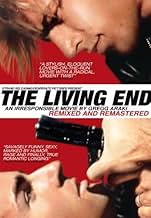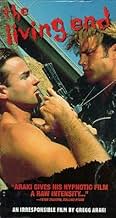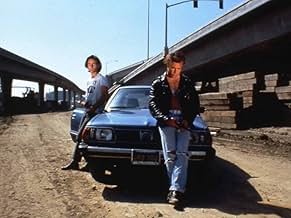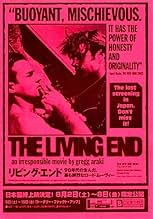NOTE IMDb
6,6/10
4,2 k
MA NOTE
Ajouter une intrigue dans votre langueLuke is a gay hustler. Jon is a movie critic. Both are HIV positive. They go on a hedonistic, dangerous journey, their motto "Fuck the world".Luke is a gay hustler. Jon is a movie critic. Both are HIV positive. They go on a hedonistic, dangerous journey, their motto "Fuck the world".Luke is a gay hustler. Jon is a movie critic. Both are HIV positive. They go on a hedonistic, dangerous journey, their motto "Fuck the world".
- Réalisation
- Scénario
- Casting principal
- Récompenses
- 1 nomination au total
Brett Vail
- Ken
- (as Bretton Vail)
Chris Mabli
- Melrose NeoNazi
- (as Christopher Mabli)
Peter Grame
- Gus
- (as Peter Gramé)
Avis à la une
The cutting edge of early '90's American film includes this work by Gregg Araki, a frightfully funny, harrowing tale of two HIV positive dudes who can't stand it all, blame (then president) George Bush, and take it all on the road for a final (?) spree. The film contains the typical cute gay boys, friendly fag-hag with her own hetero issues, violence, and ridiculously corny Araki dialogue. And guess what? It somehow all works! By the end the two protagonists are likeable people with relatable feelings. The closing scene is one of the most memorable in indie cinema of the '90's.
Let's see: Bad lighting. Ugly cinematography. Barely audible sound. Profanity laced dialogue. Amateurish performances. Protagonists whose bad behavior is supposed to represent TRUTH. Cameos by Paul Bartel and Mary Woronov. Yep, we are in the world of indie filmmaking, where the mere fact that a semi-coherent film even gets completed on a budget of a buck-ninety-two is considered an artistic achievement. THE LIVING END is a cult film and considered something a landmark of gay cinema to boot. Two guys, who are HIV+ positive, act out violently to protest ... well, to protest just about anything and everything immediately available. The "angry young gay man" syndrome is in play: We're here, we're queer, we're going to be annoying. It was pretty radical stuff for the time; pre-Ellen, pre-Will-&-Grace, pre-Queer Eye. Now, in the era of legalized gay marriage, this seems rather quaintly naive: more Hope and Crosby than Butch and Sundance, let alone Thelma and Louise.
The problem is that, divorced from its historical context, THE LIVING END is just painfully mediocre at best and just plain bad much of the time. Even overlooking the fifth rate production values, you still have a contrived story, badly written, poorly directed and awkwardly acted. The tale involves Jon, who, on the day he learns he is HIV+, encounters Luke, a leather-jacketed stud on the run from freshly killing a trio of gay bashers. Jon is a nerd (he writes film reviews); Luke is a thug (he apparently has also killed a cop); and they head out on the road to who-knows-where. Luke claims he has fallen madly in love with Jon, while Jon seems gaga over Luke apparently because Luke looks hot in a leather jacket (and even hotter minus the jacket). Ultimately their road trip goes nowhere and little is done that couldn't have just as easily been done in Jon's cramped little apartment. Toss in a bothersome side story involving Jon's mother hen (read fag hag) best friend whose sex life goes south as she worries about Jon being AWOL, and the already threadbare narrative is revealed to be even flimsier.
But to give it credit, THE LIVING END was something different in its time. It deals with gay rage, AIDS and gives us anti-heroes who are hardly role models, but at least aren't negative stereotypes from the straight point of view. The film is subtitled "An Irresponsible Film by Gregg Araki," and several of the scenes are provocative. Certainly director Araki is not interested in political correctness, particularly in the way he attempts to link sex and violence as a common impulse. Indeed, the film's most powerful moment comes at the end as it ties rape and suicide into one graphic image. The final scenes are jolting, especially considering the banality of the rest of the film.
I want to be generous to this film because it is sincere and it is important within the subgenre of gay cinema. But it just isn't very good; there just isn't any nicer way to say it. THE LIVING END is a dead end.
The problem is that, divorced from its historical context, THE LIVING END is just painfully mediocre at best and just plain bad much of the time. Even overlooking the fifth rate production values, you still have a contrived story, badly written, poorly directed and awkwardly acted. The tale involves Jon, who, on the day he learns he is HIV+, encounters Luke, a leather-jacketed stud on the run from freshly killing a trio of gay bashers. Jon is a nerd (he writes film reviews); Luke is a thug (he apparently has also killed a cop); and they head out on the road to who-knows-where. Luke claims he has fallen madly in love with Jon, while Jon seems gaga over Luke apparently because Luke looks hot in a leather jacket (and even hotter minus the jacket). Ultimately their road trip goes nowhere and little is done that couldn't have just as easily been done in Jon's cramped little apartment. Toss in a bothersome side story involving Jon's mother hen (read fag hag) best friend whose sex life goes south as she worries about Jon being AWOL, and the already threadbare narrative is revealed to be even flimsier.
But to give it credit, THE LIVING END was something different in its time. It deals with gay rage, AIDS and gives us anti-heroes who are hardly role models, but at least aren't negative stereotypes from the straight point of view. The film is subtitled "An Irresponsible Film by Gregg Araki," and several of the scenes are provocative. Certainly director Araki is not interested in political correctness, particularly in the way he attempts to link sex and violence as a common impulse. Indeed, the film's most powerful moment comes at the end as it ties rape and suicide into one graphic image. The final scenes are jolting, especially considering the banality of the rest of the film.
I want to be generous to this film because it is sincere and it is important within the subgenre of gay cinema. But it just isn't very good; there just isn't any nicer way to say it. THE LIVING END is a dead end.
"The Living End" is definitely not for everyone. But for those who can appreciate its audaciousness and free-wheeling spirit, this film offers bountiful rewards. The two leads are very attractive and play together with remarkable compatibility. They're right in tune with the director's amoral consciousness, and act the heck out of their roles. The "home movie" look to the film contributes to its quality. To me, "The Living End" is a gem of a low budget effort, brimming with vitality and youthful vigor.
I really love Araki's 'The Doom Generation' and 'Nowhere', but it's taken me some time to finally get around to watching this, his debut. Now seeing those other two first has probably ruined 'The Living End' for me, as I can't help but compare it to them, and it lacks the energy, pop culture saturation and surreal humour that appeals to me so much. 'The Living End' is more realistic and serious, and does what it does quite well for its obvious budget limitations, but I can't say I was all that impressed.
Still Araki is a great talent, and went on to better things.
Nice to see a cameo by the delicious Mary Woronov though!
Still Araki is a great talent, and went on to better things.
Nice to see a cameo by the delicious Mary Woronov though!
A film I enjoyed far more than I 'should' have, given how many individual moments I disliked.
Full of somewhat forced, wanna-be John Waters style humor that is sometimes funny, but often just over-arch and clunky. And some of the acting is weak, the rest only pretty good.
Yet underneath it all there is something moving, honest and raw in its punky rage at the world from an HIV positive point of view.
Sort of a gay, surrealist Thelma and Louise made on a shoestring. For all the moments I rolled my eyes, I feel like it will stick with me over time.
Full of somewhat forced, wanna-be John Waters style humor that is sometimes funny, but often just over-arch and clunky. And some of the acting is weak, the rest only pretty good.
Yet underneath it all there is something moving, honest and raw in its punky rage at the world from an HIV positive point of view.
Sort of a gay, surrealist Thelma and Louise made on a shoestring. For all the moments I rolled my eyes, I feel like it will stick with me over time.
Le saviez-vous
- AnecdotesThe end credits finish with the following words: "dedicated to craig lee (1954-1991) and the hundreds of thousands who've died and the hundreds of thousands more who will die because of a big white house full of republican fuckheads".
- ConnexionsFeatured in Celluloid Closet (1995)
- Bandes originalesWhere The Pavement Ends
Performed by Braindead Sound Machine
Meilleurs choix
Connectez-vous pour évaluer et suivre la liste de favoris afin de recevoir des recommandations personnalisées
- How long is The Living End?Alimenté par Alexa
Détails
Box-office
- Budget
- 22 769 $US (estimé)
- Montant brut aux États-Unis et au Canada
- 692 585 $US
- Week-end de sortie aux États-Unis et au Canada
- 43 715 $US
- 16 août 1992
- Montant brut mondial
- 692 585 $US
Contribuer à cette page
Suggérer une modification ou ajouter du contenu manquant

Lacune principale
By what name was The Living End (1992) officially released in India in English?
Répondre
























